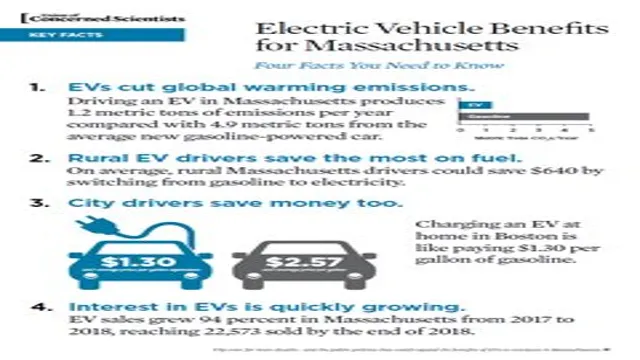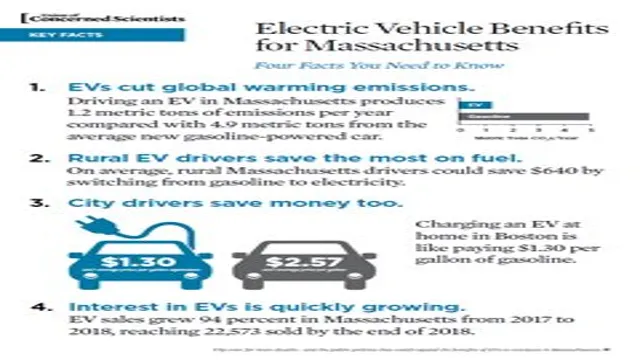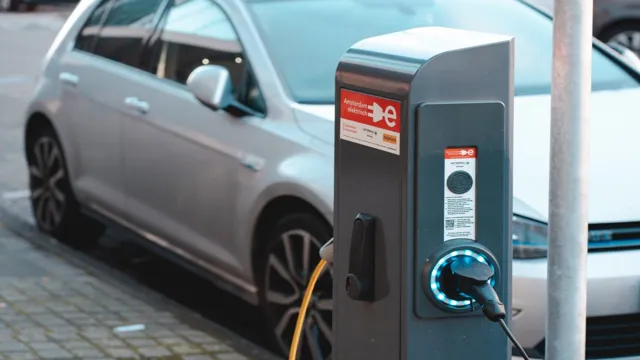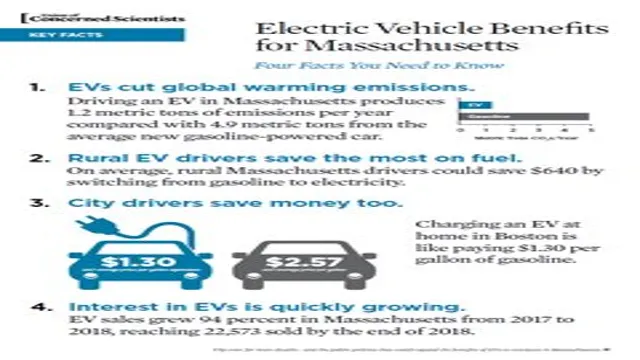Revving up the Future: The Top Benefits of Electric Cars
If you’re considering purchasing a new car, it’s important to weigh up the advantages of an electric car. These vehicles have become increasingly popular in recent years, with more and more people opting for the eco-friendly alternative to traditional petrol or diesel cars. So what are the benefits of electric cars, and why should you consider making the switch? Let’s take a closer look.
Firstly, electric cars are highly efficient and low-cost to run. While fossil fuel prices can fluctuate dramatically, electric cars can be charged from a standard mains electricity supply, which is considerably cheaper. In addition, electric cars require less maintenance as they have fewer moving parts than traditional vehicles.
This means you’ll save money on repairs and have a more reliable vehicle in the long run. Another advantage of electric cars is their environmental impact. As they don’t produce harmful emissions, they’re much kinder to the planet than petrol or diesel-powered cars.
This means you can enjoy a guilt-free drive while doing your bit for the environment. Lastly, electric cars are incredibly convenient. With charging points popping up in towns and cities across the country, you’ll never be too far from a charging station.
Plus, with many manufacturers now offering longer battery life and faster charging times, electric cars are becoming a realistic option for everyday driving. So, if you’re looking for a cost-effective, eco-friendly and hassle-free way to get around, it’s definitely worth considering an electric car. With their efficiency, reliability and versatility, they could well be the future of driving.
Cost Savings
One of the most significant benefits of electric cars is the cost savings they provide. When compared to traditional gasoline-powered vehicles, electric cars offer significant long-term savings due to lower operational and maintenance costs. Firstly, electric cars have considerably lower fuel costs since they run on electricity and not expensive gasoline.
Additionally, electric cars have fewer moving parts, which means less wear and tear on the car and less maintenance and repair costs. On top of that, electric cars have longer lifespans, which means one can save significant money in the long run by not having to replace their car as often. Moreover, electric cars are eligible for tax credits and in some cases, can get additional incentives like reduced tolls, free parking, and access to carpool lanes.
All in all, while electric cars may have a higher upfront cost, one can save a substantial amount of money in the long run while reducing their carbon footprint.
Lower Fuel Costs
Lower Fuel Costs – Cost Savings When it comes to reducing your expenses, fuel costs can be a significant burden. However, there are simple steps you can take to lower your fuel expenses and save money. One of the best ways to save on fuel costs is to ensure your vehicle is properly maintained.
Simple steps like regular oil changes, tire rotations, and air filter replacements can go a long way in improving fuel efficiency. Additionally, consider adjusting your driving habits. Avoiding sudden stops or accelerating too quickly can also improve your fuel economy.
Another way to save on fuel costs is to shop around for the best price. Use apps or resources to find gas stations with the cheapest prices in your area. By taking these simple steps, you can save money on fuel costs and put that extra cash towards other expenses.
So why not start today and see the difference in your savings?
Tax Incentives and Rebates
Tax incentives and rebates can be a significant cost-saving opportunity for businesses and individuals alike. Many governments offer tax incentives and rebates to encourage the adoption of environmentally friendly practices or investment in renewable energy sources. For example, a business that installs solar panels may be eligible for a tax credit or rebate, which can offset the upfront costs of the installation.
These incentives can provide financial relief and encourage more sustainable practices, helping both companies and individuals save on energy costs in the long run. Additionally, tax incentives can encourage individuals to invest in renewable energy sources, such as electric cars or energy-efficient appliances, which not only benefits the environment but can also save money on energy bills. Taking advantage of available tax incentives and rebates can lead to significant cost savings and help promote sustainable practices.
Environmental Benefits
One of the biggest environmental benefits of electric cars is their ability to reduce greenhouse gas emissions. Unlike traditional gas-powered vehicles, electric cars run on rechargeable batteries that do not produce harmful emissions. This means that electric cars can potentially help reduce air pollution and improve air quality in cities around the world.
In addition, the use of electric cars can also reduce our dependence on fossil fuels, contributing to a more sustainable future. By opting to drive electric cars, we can contribute to reducing our carbon footprint and the impact of climate change. In short, the benefit of electric cars extends beyond personal convenience but has a positive impact on our environment and the earth as a whole.
Reduced Emissions
Reduced emissions provide numerous environmental benefits and are becoming increasingly important to combat climate change. Lowering the amount of greenhouse gases that industries and transportation emit helps to slow down global warming, reduce air pollution, and improve overall air quality. This not only benefits the environment but also promotes public health, as cleaner air can result in decreased respiratory issues.
Additionally, reducing emissions can provide economic benefits by reducing healthcare costs and improving workforce productivity. While it may require changes to current practices and investments in new technology, the long-term benefits of reduced emissions are undeniable. As individuals, we can also play a role in reducing emissions by choosing environmentally-friendly options, such as walking or biking instead of driving, or opting for energy-efficient appliances and light bulbs.
Every small action can contribute to a cleaner, healthier planet for future generations.
Improved Air Quality
Improved air quality is one of the most significant environmental benefits that come with reducing air pollution. When emissions from factories, cars, and power plants are decreased, the quality of the air we breathe is improved, creating a healthier environment for all of us. In addition to improving public health, cleaner air also helps to reduce the overall impact of human activity on the environment.
By reducing air pollution, we can help to protect the ozone layer and safeguard the planet from catastrophic climate change. Organic solutions like planting more trees and improving public transportation can help to reduce air pollution, allowing us to breathe easier and enjoy a cleaner, more sustainable environment. Overall, making the effort to reduce air pollution has a positive ripple effect on both our individual health and the health of the planet itself.
Less Noise Pollution
Less noise pollution has significant environmental benefits that positively impact our planet and our health. One of the most significant benefits is the reduction of noise-induced stress on marine animals. Marine mammals, such as whales and dolphins, use sound to communicate and navigate in their environment.
However, increasing noise from ships, sonar, and oil exploration activities have interfered with their behavior, causing them to strand on beaches and change their migration paths. By reducing noise pollution, we can help protect the sensitive hearing of marine mammals and ensure their survival. Additionally, less noise pollution can also benefit human health as it has been linked to an increased risk of cardiovascular disease, hypertension, and even hearing loss.
By reducing noise levels, especially in urban areas with high traffic and industrial activities, we can improve public health outcomes and promote a healthier living environment for everyone. Overall, reducing noise pollution is a critical step in protecting our planet’s biodiversity and ensuring a sustainable future for all living creatures.
Performance and Convenience
One major benefit of electric cars is their impressive performance and convenience compared to traditional gas-powered vehicles. With instant torque and smooth acceleration, electric cars offer a thrilling and responsive driving experience. Plus, they require less maintenance than gas cars since they have fewer moving parts and don’t need regular oil changes.
Not only that, but charging an electric car is often more convenient than stopping at a gas station. Many electric vehicles can be charged at home overnight, saving time and hassle. And with the growing network of public charging stations, long road trips in an electric car are becoming increasingly feasible.
Overall, electric cars offer a superior driving experience that is both convenient and environmentally friendly.
Instant Torque and Acceleration
Electric vehicles offer drivers instant torque and acceleration, providing both performance and convenience. Unlike traditional gasoline cars, electric cars do not require a transmission to translate their power to the wheels. Instead, electric cars use a motor to propel the vehicle forward, and this motor can provide full torque as soon as the driver steps on the accelerator pedal.
This means that electric vehicles can accelerate quickly and smoothly, making them a pleasure to drive. Additionally, because of their lack of a traditional transmission, electric vehicles are often easier to drive in traffic and other congested areas, as they can quickly and easily change their speed without the need for shifting gears. Overall, the instant torque and acceleration of electric vehicles make them a popular choice for drivers who value both performance and convenience.
Less Maintenance Needed
Less Maintenance Needed When it comes to choosing products and services, performance and convenience go hand in hand. With less maintenance needed, you can have the peace of mind that your investment will last longer and require fewer repairs. This not only saves you time and money, but it also allows you to focus on other tasks.
Whether it’s a car that requires less frequent oil changes or a computer that runs smoothly with minimum updates, we all appreciate products that reduce our workload. It’s like having a reliable assistant who can take care of tasks without you having to micromanage them. Moreover, the benefits go beyond personal convenience as these products often have a positive impact on the environment by reducing waste and resource consumption.
By choosing products that require less maintenance, you can enjoy performance and convenience without sacrificing quality or sustainability.
Future Sustainability
Electric cars have become increasingly popular due to their benefits for the environment and savings on fuel costs. These vehicles run entirely on electricity, meaning they produce zero emissions and therefore contribute to a cleaner and healthier planet. Not only that, but the cost of electricity is typically much lower than gasoline, which allows drivers to save money on fuel in the long run.
Additionally, electric cars require less maintenance and are more efficient due to their regenerative braking systems. Though they do require regular charging, with the expanding network of charging stations and home charging options, this is becoming less of a concern. Overall, the environmental and financial benefits of electric cars make them a promising investment for a sustainable future.
Conclusion
In conclusion, electric cars offer numerous benefits that cannot be ignored. Not only are they environmentally friendly, but they also reduce our dependency on fossil fuels and promote energy independence. Additionally, electric cars are more cost-effective in the long run, with lower maintenance costs and longer lifespans than traditional gas-powered vehicles.
So, if you’re looking for a way to make a “green” difference while saving money in the process, investing in an electric car is a smart and savvy choice. As an added bonus, you’ll also be the coolest, carbon-neutral driver on the block. Who wouldn’t want that?”
FAQs
What are some benefits of driving an electric car?
Electric cars are environmentally friendly as they do not emit harmful pollutants. They are also cheaper to maintain and operate, as they require less frequent visits to the gas station and have fewer moving parts that require maintenance.
How does driving an electric car benefit my wallet?
Driving an electric car saves you money in the long run as they require less maintenance, have lower fuel costs and qualify for tax incentives. Additionally, electric cars have a longer lifespan, which further increases their value proposition.
How do electric cars contribute to a greener future?
As mentioned earlier, electric cars do not emit harmful pollutants, hence reducing air pollution. Furthermore, electric cars can be powered with renewable energy sources such as solar and wind, hence reducing reliance on fossil fuels.
What are some common misconceptions about electric cars?
Some common misconceptions about electric cars include that they do not have enough range, they are slow, and they are expensive. However, electric cars are constantly improving, and many are already on par with their gasoline counterparts in terms of speed and range while being affordable to own and operate.





